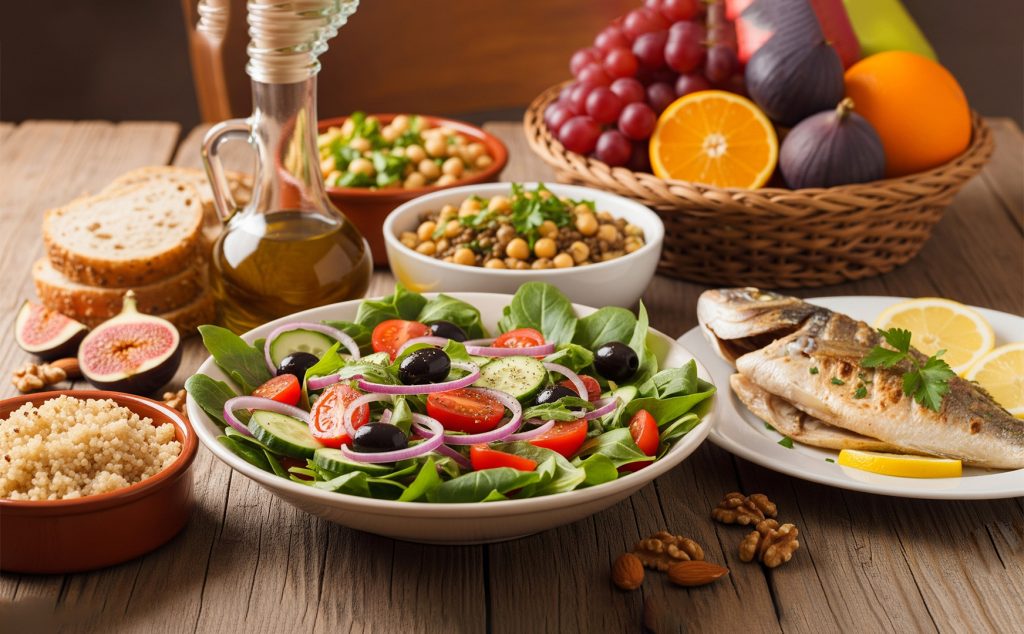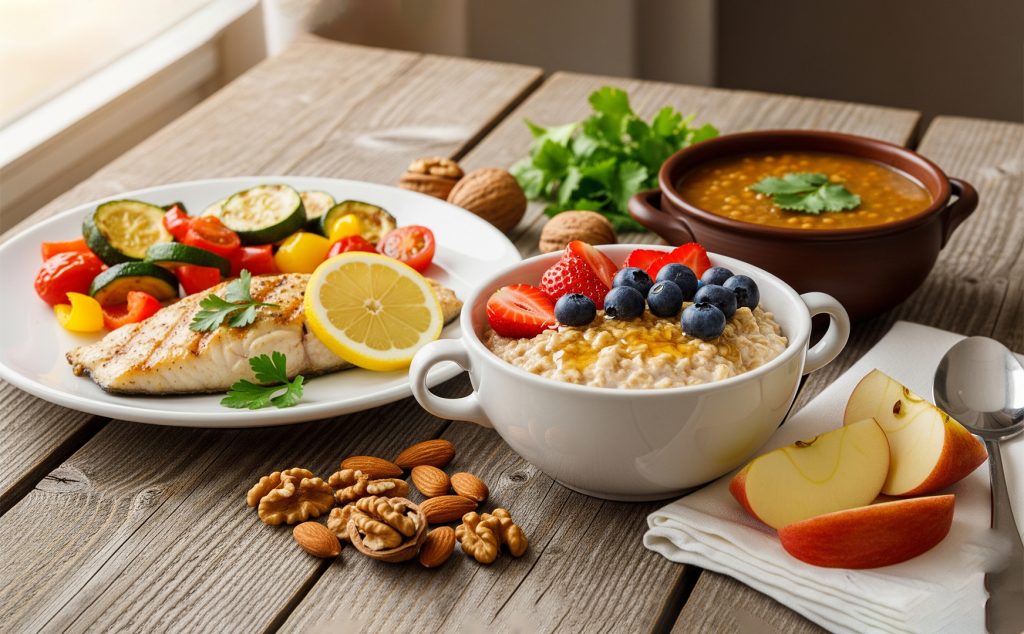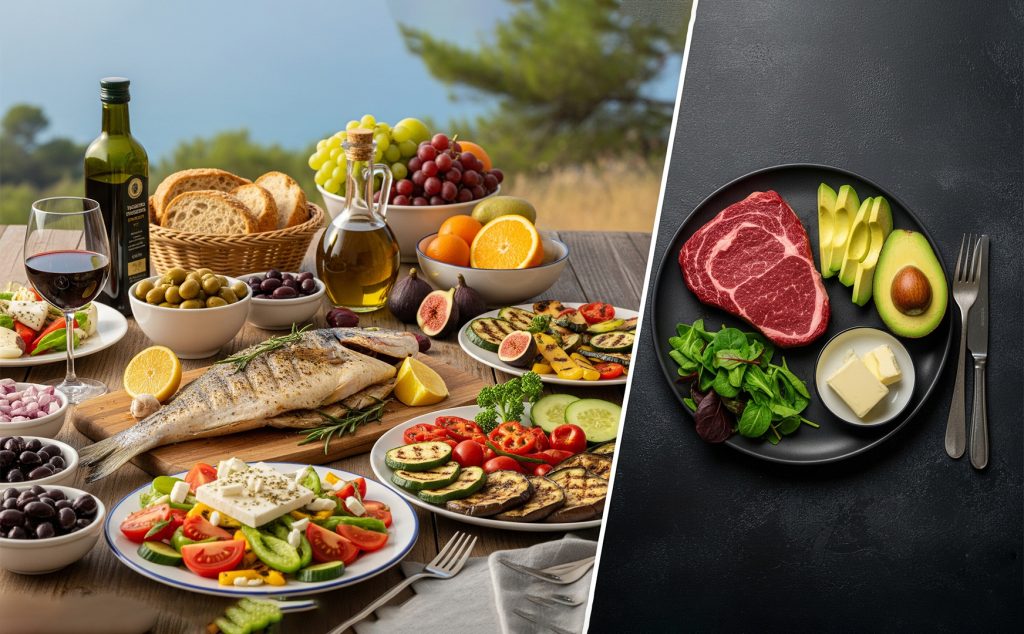Have you ever thought that a diet could be more than just a temporary plan to lose weight? In reality, the word “diet” doesn’t mean restriction or starvation—it simply means the way we eat every day. Among all the popular diets, the Mediterranean Diet stands out as one of the most scientifically proven and health-promoting eating patterns.
What makes this diet unique is that it doesn’t focus on complicated calorie counting or depriving yourself of the foods you love. Instead, it emphasizes balance, fresh ingredients, and physical activity. That’s why it’s not just a “weight loss diet,” but a holistic lifestyle that improves both your physical and mental health.
What is the Mediterranean Diet?
1- A Simple Definition of the Mediterranean Diet
The Mediterranean Diet is the traditional eating pattern of people living around the Mediterranean region (Italy, Greece, Spain, Southern France). It is mainly based on fresh vegetables and fruits, olive oil, whole grains, fish, and legumes, with moderate consumption of meat and dairy products.
2- Origins of the Mediterranean Diet
This is not a new trend—it has existed for thousands of years. Mediterranean populations relied on natural, seasonal ingredients: olives, grapes, wheat, vegetables, and fish from the sea. This made their diet naturally balanced and rich in nutrients.
4- Why Has It Become One of the Most Popular Diets?
Because it’s not just a “trend,” but a scientifically backed eating style. The World Health Organization has recognized the Mediterranean Diet as one of the best for preventing chronic diseases such as heart disease and diabetes. It also encourages enjoying food instead of feeling deprived.

Core Components of the Mediterranean Diet
1- Fresh Vegetables and Fruits – The Daily Foundation
They are the backbone of the diet, packed with fiber, vitamins, and minerals. Eating them daily improves digestion and lowers the risk of chronic illnesses.
-
- Example: A colorful salad with olive oil for lunch.
- Example: Seasonal fruits as a snack.
2- Whole Grains and Legumes
Oats, brown rice, lentils, chickpeas—excellent sources of fiber and energy. They help you stay full for longer.
-
- Example: Replace white bread with whole grain bread.
- Example: Warm lentil soup in winter.
3- Olive Oil – The “Liquid Gold”
The iconic ingredient of the Mediterranean Diet. It’s rich in healthy fats (omega-9) that support heart health.
-
- Example: A drizzle of olive oil on salads instead of heavy dressings.
4- Fish and Seafood
A great source of protein and omega-3. Recommended at least twice a week.
-
- Example: Grilled fish with roasted vegetables.
5- Nuts and Seeds
Almonds, walnuts, chia seeds—nutritious, filling snacks full of healthy fats and antioxidants.
6- Dairy in Moderation
Natural yogurt or low-fat cheese provide protein and calcium without excess fat.
7- Meat (White and Red)
Poultry and lean meats are allowed, usually once a week. The Mediterranean Diet doesn’t ban meat, but promotes moderation.

Health Benefits of the Mediterranean Diet :
- Heart and Cardiovascular Health
Healthy fats from olive oil and fish lower bad cholesterol and keep arteries healthy. - Healthy Weight Loss
Rich in fiber and protein, it promotes satiety without deprivation. - Brain and Memory Health
Omega-3s and antioxidants protect brain cells and reduce the risk of Alzheimer’s. - Boosted Immunity
Vegetables and fruits provide essential vitamins (C, A, E) that strengthen the immune system. - Blood Sugar Control
Because it’s based on natural, slow-digesting foods, it prevents sudden blood sugar spikes.

Practical Examples to Include the Mediterranean Diet in Your Daily Life :
1- Breakfast Ideas :
-
- Oatmeal with fruit and honey.
- Yogurt with walnuts and berries.
2- Lunch Ideas :
-
- Grilled fish with brown rice.
- Chickpea salad with whole grain bread.
3- Dinner Ideas :
-
- Lentil soup with green salad.
- Grilled chicken with olive oil.
4- Healthy Snacks :
-
- A handful of nuts.
- An apple with natural peanut butter.

The Mediterranean Diet as a Lifestyle
The Mediterranean Diet is not just about what you eat, but how you live. It combines physical health, mental well-being, and social habits, making it flexible, enjoyable, and sustainable.
-
-
Shared Family Meals :
-
In Mediterranean culture, meals are often enjoyed with family or friends. It’s not just about food, but the experience: laughter, conversations, and bonding. This slower, mindful eating promotes satiety without overeating. Research shows that people who share meals with others are more likely to stick to healthy eating patterns—a key factor behind the success of the Mediterranean Diet.
-
-
Physical Activity as a Natural Part of Life
-
This lifestyle isn’t only about food—it’s also about movement. Walking, cycling, gardening, and even household chores are part of the tradition. These daily activities maintain a healthy weight, improve circulation, and boost energy. You don’t need intense workouts—just 30 minutes of walking a day can make a huge difference.
-
-
Home Cooking Over Fast Food
-
The diet relies on fresh ingredients, olive oil, vegetables, and fruits, which naturally fits with home cooking. Fast food is usually packed with unhealthy fats, sugar, and preservatives. Cooking at home gives you full control over ingredients and encourages experimenting with new recipes. Plus, cooking together can be a fun family activity.
-
-
Better Mood and Mental Health
-
Food doesn’t just fuel the body—it affects the mind. The Mediterranean Diet is rich in omega-3, vitamins, and antioxidants that reduce stress and inflammation. Combined with the joy of shared meals and balanced eating, this leads to lower rates of depression and anxiety. Studies show that people following this diet report improved mood and mental well-being.

Tips for Success on the Mediterranean Diet
Following the Mediterranean Diet doesn’t need to be complicated. Like any lifestyle change, success comes with gradual steps and planning. Here are some practical tips:
-
- Start Gradually
Don’t try to change everything at once. Begin with small shifts: switch to whole grain bread, add one fish meal per week, or increase your daily fruit and vegetable intake. Gradual changes are easier to maintain and help your body adjust.
-
- Reduce Sugar and Soft Drinks
This diet encourages minimizing added sugars. Slowly cut down on soda and packaged juices, replacing them with water, herbal teas, or fresh juice. Too much sugar not only leads to weight gain but also harms heart health and energy levels. For a sweet craving, choose fresh fruit or a small piece of dark chocolate.
-
- Plan Weekly Meals
Without planning, it’s easy to fall back on fast food. Dedicate an hour at the weekend to plan meals and shopping. For example: two days of fish, one day of legumes, two days of whole grains and vegetables. This ensures variety and balance without the daily stress of deciding “what to eat.”
-
- Experiment with New Recipes Using Olive Oil and Legumes
Variety keeps the diet exciting. Olive oil and legumes are staples of the Mediterranean Diet, so try new recipes: hummus salad with lemon and olive oil, lentil pasta, or bread infused with olive oil and herbs. This keeps meals enjoyable and prevents boredom.

Comparing the Mediterranean Diet with Other Diets
- Mediterranean Diet vs. Keto
Keto is high in fats and extremely low in carbs, while the Mediterranean Diet is more balanced, making it easier to sustain long-term. - Mediterranean Diet vs. Vegan
The vegan diet excludes all animal products, whereas the Mediterranean Diet allows moderate consumption of poultry, dairy, and occasional meat. - Sustainability of the Mediterranean Diet
Because it’s diverse, flexible, and not restrictive, it’s one of the easiest diets to follow for life.

The Mediterranean Diet is far more than a weight-loss plan—it’s a sustainable lifestyle that balances healthy eating with enjoyment. With fresh vegetables, fruits, olive oil, fish, and whole grains at its core, it supports long-term health, boosts mood, and promotes longevity.





